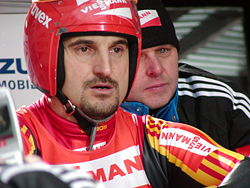
The 2002 Winter Olympics, officially known by the International Olympic Committee as the XIX Olympic Winter Games, [2] was an international multi-sport event held in Salt Lake City, Utah, United States, from 8 February through 24 February 2002. A total of 2399 athletes from 77 National Olympic Committees (NOCs) participated at the Games in 78 events across 15 disciplines. [3] [4] [5]
Contents
- Alpine skiing
- Biathlon
- Bobsleigh
- Cross-country skiing
- Curling
- Figure skating
- Freestyle skiing
- Ice hockey
- Luge
- Nordic combined
- Short track speed skating
- Skeleton
- Ski jumping
- Snowboarding
- Speed skating
- Medal winner changes
- Medal leaders
- See also
- References
- External links
New events were contested in these Games; skeleton (introduced for the first time at the 1928 Winter Olympics and not contested since 1948) [6] was re-introduced with events for both men and women, while women's bobsleigh was added to the program. The 78 events in Salt Lake City were an increase from 68 in Nagano at the 1998 Winter Olympics. [7] Both men and women competed at these Games. [3]
A total of 407 athletes won at least one medal at the Games. [8] Athletes from Norway topped the medal table with the most gold medals, winning 13 golds out of 25 total medals. Germany won the most medals overall with 36, of which 12 were gold. Host nation the United States won 34 medals, 10 of them gold. Athletes from 24 participating NOCs won at least one medal; and competitors from 18 won at least one gold medal. [9] Athletes from Australia and China won their respective nations' first Winter Olympic gold medals, while the Croatian and Estonian delegations each won their first Winter Olympic medals of any color. [3] Of the 407 medalists, 55 athletes won more than one medal of any color at the Games. Of the multiple medalists, 31 won at least one gold medal, and 13 won multiple gold medals. [9]
A judging scandal in the pairs figure skating event, where it was revealed that a French judge had been bribed to inflate the scores of the Russian pair, led to the declaration of joint Olympic champions in the pairs event. Georg Hackl of Germany finished in second in the men's luge singles event, becoming the first athlete to win a medal at five consecutive Games in the same individual event. [3] The United States teams, in the four-man bobsleigh event, won the country's first bobsleigh medals in 46 years. The 2002 Games also saw the first Winter Olympics gold medalists of African origin: Vonetta Flowers of the United States in the women's bobsleigh event, and Canada's Jarome Iginla in men's ice hockey. [3] The Games saw improved doping testing conditions; four medalists (three from Russia and one from Spain) were stripped of their medals as a result of doping disqualifications. Ole Einar Bjørndalen was the Games' most decorated athlete, winning four gold medals; Janica Kostelić was the best-performing female athlete with three golds and a silver medal. [9] Finnish athlete Samppa Lajunen became the first person to win three Nordic combined gold medals at a single Olympics, while Simon Ammann of Switzerland, who had not won a FIS Ski Jumping World Cup event before the Games, was the surprise performer, winning the gold medal on both the normal and large hills. [3]
| Contents | ||
| Medal winner changes Medal leaders References | ||










